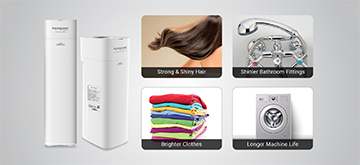
What are the Benefits of Using a Water Softener?
PUBLISHED ON: 06-Mar-2024
Water is an essential resource for everyone but not all water is equal. Hard water, which has a high calcium and magnesium mineral concentration, is common and presents problems for people. Water softeners are a blessing for people who are suffering from the consequences of hard water, such as intense hair fall, rough skin, stains on ceramics and bathroom fixtures, residue on utensils, and clothes discolouration.
In this article, we will understand the functions, advantages, and benefits of water softeners, which make them an excellent addition to any home. But before that let’s understand what hard water is.
What is Hard Water?
Hard water is high in minerals like magnesium and calcium that are naturally present in the environment. As the water flows through soil and rock it collects these minerals.
The degree of hardness in water depends on the concentration of these minerals, and based on this concentration, hard water is classified into different categories—very hard, hard, and moderately hard. Very hard water has a hardness level of more than 180 mg/l. Meanwhile, hard and moderately hard have a hardness level of 120 to 180 mg/l and 60-120 mg/l respectively.
What is a Water Softener?
Water softeners are devices that remove minerals such as calcium and magnesium from hard water. They work on the ion exchange concept, in which resin beads in the softener attract and replace hardness causing minerals like calcium and magnesium ions with sodium ions, resulting in softened water.
How does a Water Softener System Work?
Hard water causes mineral deposits in fixtures called limescale. The deposits can lead to clogged fixtures, decreased appliance efficiency, and even skin and hair problems. So a water softener system solves the problem of hard water with a regeneration procedure.
Water softener regeneration is a key procedure that rejuvenates the resin beads, ensuring they retain their ion exchange capabilities. As the resin beads absorb hardness ions, they get saturated and require regeneration to continue softening water effectively. A brine solution is put into the resin tank during regeneration, flushing out accumulated minerals and refilling the resin with sodium ions.
In addition to providing smoother skin and hair, water softeners are a wonderful way to get rid of hard water and dissolve limescale buildups.
What are the benefits of water softeners?
1. Prevents Hair Fall
Experts believe that the presence of calcium and magnesium in hard water may result in the accumulation of deposits on the scalp, which blocks the scalp from absorbing the moisturizer from the hair conditioners, contributing to frizz and dullness. This buildup can also lead to an itchy scalp. A water softener can tackle the high minerals in your water and prevent hair fall.
2. Prevents Rough Skin
Experts believe that hard water can lead to skin dryness and irritation, primarily due to the skin’s incapability to dissolve soap.The residue of unrinsed soap tends to strip off the skin of its natural oils, resulting in dry and itchy skin. Moreover, excess minerals present in hard water can directly dry the skin, causing pore blockages and acne breakouts. A water softener solves this problem by providing you with soft water.
3. Protects Bathroom Fixtures
Over time, minerals from hard water, such as calcium and magnesium, can accumulate over bathroom fixtures causing potential damage. By removing harmful minerals from your water, water softeners shield your systems and fixtures from harm.
4. Increases the Lifespan of Appliances
Hard water may lead to the buildup of mineral deposits in home appliances like water heaters, dishwashers, and washing machines. You may avoid these deposits and increase the longevity of your equipment by utilizing a water softener.
5. Reduces Scale Buildup
Hard water can leave ugly and challenging-to-clean scale deposits on faucets, showerheads, and other bathroom fixtures. You may reduce scale buildup and improve the efficiency of cleaning operations by utilizing a water softener.
6. Brighter, Softer Laundry
When clothes are washed in hard water, their colour and softness is adversely affected.Using hard water for laundry can lead to fabric discolouration, making them look grey.1 Water softener helps minimize the effects of hard water on laundry.
What are the Maintenance and Cost Savings benefits of water softeners?
Water softeners save money overall by lowering appliance wear. They protect home appliances from untimely corrosion and repair, resulting in optimal functioning. Moreover, water softeners protect your ceramics and luxurious fittings from stains caused by hard water. Thus, water softeners are an affordable and practical solution for homeowners.
Conclusion
To sum up, the advantages of having a water softener system surpass the instant gratification of smoother skin or spotless dishes. Home water softeners are essential for maintaining appliance efficiency, improving the quality of water in the entire house, and saving money over the long run.
Purchasing a water softener is an intelligent and worthwhile decision for homes looking for a workable solution to the problems caused by hard water.
If you are looking for water softeners, opt for Aquaguard Select Water Softeners. They have a fully automatic water softener with advanced ion exchange technology to soften water without manual regeneration. Additionally, these water softeners have Multiple Regeneration modes that optimises your salt and water consumption. Moreover, the IntelliMix Technology in these water softener blends untreated hard water into softened water, avoiding water wastage. Furthermore, the easy-to-read LCD Display Panel keeps you informed about your water softener’s current setting, and the Holiday Mode ensures that the water softener works on standby mode automatically when you are not around.
Lastly, installing Aquaguard Select’s water softener helps get rid of hard water which may cause hair fall, dry itchy skin, and stains on sinks, bathroom fittings, and appliances.
Reference
1. Sekhri, S., & Gupta, N. (2016). Water quality considerations for better laundry. ResearchGate. https://www.researchgate.net/publication/354583257_Water_quality_considerations_for_better_laundry /Accessed on 15/02/2024.
